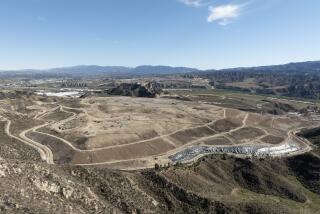L. A. Retreats From Decision Over Lopez Dump : Landfill: In abandoning its plan to comply with state limits, the City Council said the city already is trying to scale back dumping.
The Los Angeles City Council backed away Friday from an earlier decision to voluntarily comply with state limits on operations at Lopez Canyon Landfill, accepting the city Bureau of Sanitation’s assertion that it already is making efforts to scale back dumping.
But several council members made it clear that they would not support a proposed expansion of the northeast San Fernando Valley dump until alternative methods of trash disposal are fully studied.
“We shouldn’t rely on urban landfills any more,” Councilman Joel Wachs said. “We need alternatives. That may cost us money, but it’s a price worth paying.”
State authorities have tried to reduce the city’s use of the dump, which gets two-thirds of the city’s residential trash. But the city won a restraining order from a Superior Court judge who accepted arguments that the city cannot do so. Since then, the city had promised to comply voluntarily with some of the overturned state restrictions.
Meanwhile, in another room at City Hall, a continued public hearing on the proposed expansion of Lopez Canyon, the only city-operated dump, drew questions and criticism from politicians and neighbors. The Board of Public Works hearing began Monday night at the Lake View Terrace Recreation Center.
Lopez Canyon had been scheduled to close in 1992. However, the Bureau of Sanitation last year announced plans to double the landfill’s size and extend its life through at least 2002.
“When the city of Los Angeles breaks its promise about Lopez Canyon Landfill, more than landscape is lost,” said a statement by Assemblyman Richard Katz (D-Sylmar), which was read at the hearing Friday by one of his aides. “Homes were purchased and lives were planned based on the promise that Lopez Canyon would be closed in 1992.”
Neighbors recited a litany of problems at the dump, ranging from polluted water runoff to children becoming ill from landfill gas emissions. They said that if the city cannot prevent these problems now, it should not be allowed to enlarge the dump.
“There simply is too much trash generating too much gas too close to a residential community,” said Rob Zapple, who lives in nearby Kagel Canyon.
An environmental impact report on the expansion, including answers to concerns raised during the two hearings this week, will be completed within three weeks, according to the Bureau of Sanitation staff. The City Council will vote on the expansion proposal in the spring.
From the beginning, neighbors were unhappy with the expansion plans. They became even angrier when they learned that two landfill workers had fainted last spring after inhaling toxic gas from a pocket that they accidentally unearthed.
The state Waste Management Board stepped up its review of the landfill after the accident. In July, it ordered the city to scale back dumping at Lopez Canyon to levels agreed to in a 1978 permit. The city had been operating under less restrictive conditions in a 1983 report, which the city contends amended the 1978 permit.
Wachs and Councilman Ernani Bernardi, who represent dump neighbors, asked that the City Council instruct the sanitation bureau to voluntarily comply with the state order, even though city attorneys were challenging the order in Superior Court.
Council members approved the Wachs-Bernardi measure at the end of July, then changed their votes after city attorneys asked them not to act while the court appeal was pending. In September, the city won a temporary restraining order against the state limitations.
The council voted Friday to take no action on the Wachs-Bernardi call for voluntary compliance, effectively reversing the council’s earlier support of their request.
On Friday, Bernardi grilled Bureau of Sanitation Director Delwin A. Biagi about how well the city is complying with its pledge of partial voluntary compliance the state order. Biagi responded that the city has cut back the number of trucks dumping in Lopez Canyon, has stopped dumping on a piece of U.S. Forest Service land next to the dump and is preparing a new area for dumping so that it can limit the height of the present trash mounds.
Although Bernardi and Wachs said they were disturbed that garbage mounds at the dump remain taller than the level stipulated in the state’s order, Wachs said he was glad that the city had taken some steps to comply.
“I hope we’ve learned we shouldn’t have to wait to be forced to do something,” he said. “We should do it because it’s right to do it.”
In a separate action Friday, the council approved spending $2.1 million to dump refuse from the Bureau of Street Maintenance and the Department of Recreation and Parks in private landfills around the county. Finding other places to take bulky waste such as grass, tree trimmings and broken asphalt leaves more space at Lopez Canyon for residential garbage.
The $2.1 million was transferred from a contingency fund already in the Bureau of Sanitation budget.
More to Read
Sign up for Essential California
The most important California stories and recommendations in your inbox every morning.
You may occasionally receive promotional content from the Los Angeles Times.










